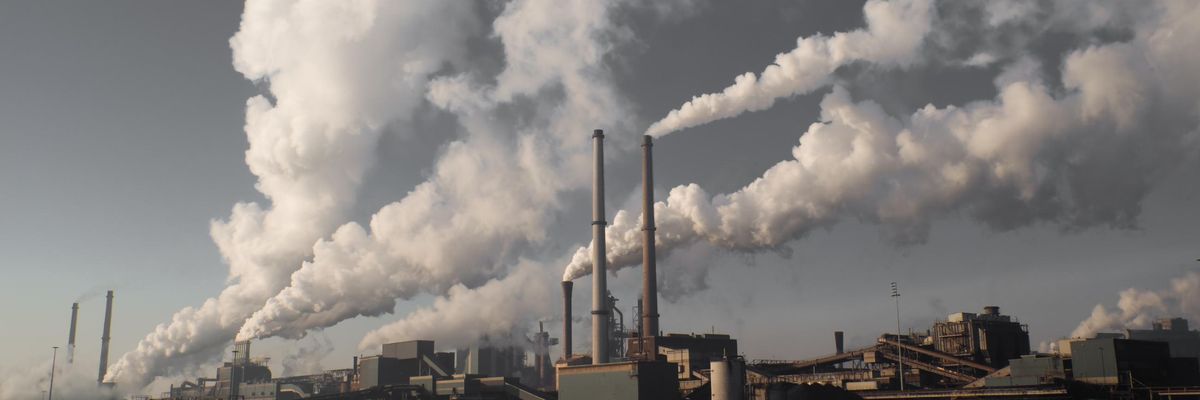Despite the growing necessity of transitioning to renewable energy, the share of fossil fuels in the world's total energy mix barely changed during a recent decade, according to a report released Tuesday by the Paris-based think tank REN21.
"The share of fossil fuels in final energy consumption has not moved by an inch."
--Rana Adib, REN21
"We are waking up to the bitter reality that the climate policy promises over the past 10 years have mostly been empty words," said REN21 executive director Rana Adib.
"The share of fossil fuels in final energy consumption has not moved by an inch," Adib added. "Phasing them out and making renewables the new norm are the strongest actions we can take."
The group's Renewables 2021 Global Status Report(pdf) says that fossil fuels accounted for 80.3% of energy consumption in 2009, compared with 80.2% in 2019. Over that period, "modern renewables" only grew from 8.7% to 11.2%.
The 2019 breakdown in the renewables category--based on data from the International Energy Agency (IEA)--was: 1% biofuels for transport; 2.4% wind, solar, biomass, geothermal, and ocean power; 3.6% hydropower; and 4.2% biomass, solar, and geothermal heat.
REN21's latest annual report comes after the IEA last month projected significant increases in renewable capacity over the next two years and warned that fossil fuels must stay in the ground to avoid the most catastrophic impacts of the human-caused climate emergency.
"2020 could have been a game-changer," the think tank noted in a statement (pdf). "Economies worldwide were ravaged by the Covid-19 pandemic. Primary energy demand fell by 4%."
However, Group of 20 (G20) countries, "the planet's biggest polluters, barely met or even missed their unambitious renewable energy targets," the statement continued. "But the benefits of renewables in terms of health, climate, and job creation are indisputable."
REN21 found that the five G20 nations with renewable energy goals struggled to reach them, while the remaining members of the international forum--which includes the European Union and 19 countries with major economies--didn't even have such targets.
The new report, the statement added, "shows that we are nowhere near the necessary paradigm shift towards a clean, healthier, and more equitable energy future."
Although the pandemic era has seen some bolder climate commitments--including net-zero carbon emissions targets from China, Japan, and South Korea--coronavirus recovery packages have also featured hefty investments in fossil fuels, especially compared with funds put toward renewable energy.
"Unfortunately the harsh lesson from the pandemic is that most governments did not use the unique opportunity to further curtail carbon pollution and break the resistance of the fossil fuel incumbents," said Stephan Singer, a senior adviser at Climate Action Network (CAN) International. "What counts for them is corporate profit--neither the climate nor people's health."
REN21 highlights the recent rise in renewable capacity and that "it is now cheaper to build new wind or solar PV plants than to operate existing coal-fired power plants," bolstering scientists' warnings and activists' demands about the necessity of overhauling the global energy system.
Reporting on the findings Tuesday, Reuterspointed out that "renewables also are outcompeting new natural gas-fired power plants on cost in many locations, and are the cheapest sources of new electricity generation in countries across all major continents."
According to Sam Kimmins, head of the global corporate renewable energy initiative RE100, "The renewable energy transition is gaining pace because it makes business sense as well as environmental sense."
"Renewable electricity is already creating millions of jobs, saving businesses money, and providing energy access to millions," Kimmins said. "But businesses and governments need to go faster, not only for the environment, but to remain competitive in a renewably powered 21st-century economy."
In a series of tweets about the new report, the climate advocacy group 350.org declared that "rich governments are doing the EXACT OPPOSITE of what they need to do" and emphasized the need to not only invest in renewables but also urgently end the use of fossil fuels.
REN21's Adib concurred, saying that "governments must not only support renewables but also rapidly decommission fossil fuel capacity."
"A good way to accelerate development is to make the uptake of renewable energy a key performance indicator for every economic activity, every budget, and every single public purchase," she said. "Thus, every ministry should have short- and long-term targets and plans to shift to renewable energy coupled with clear end-dates for fossil fuels."

